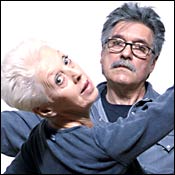
David Gordon’s new piece takes place in a rehearsal studio, where the dancers in his company are chatting away while they work. Actually, they’re onstage at the Joyce Theater, speaking lines he wrote for them—this is not the dance equivalent of reality TV—but in Private Lives of Dancers 2003, Gordon has dispensed with many of the other boundaries that normally separate onstage from off. He and his wife, the dancer Valda Setterfield, unabashedly portray themselves, and a stage manager cues the dancers when they forget a line. (Or maybe the forgetting is scripted, too.) Now and then, the dancers stop talking and focus their dancing across the footlights. Gordon has never been too impressed by the difference between life and art. What he likes to do is set up shop right on the border.
For years, Gordon refused to categorize what he did as choreography, even if he happened to be doing it for American Ballet Theatre. “I make work,” he would say politely but implacably when the subject came up. Since founding the Pick Up Performance Company in 1978, he’s been making funny, poignant theater pieces with more or less dancing in them, quite a bit of talking, and a swath of sentiment loosely wrapped in cool detachment. But in Private Lives, he seems to be releasing his inner choreographer. Dance is both medium and metaphor here, and it brings us one of his very best works.
The piece begins with Gordon and Setterfield setting up the Joyce’s bare stage for a morning rehearsal. They lug big, windowed panels onto the stage and hinge them together, Setterfield fairly chipper as she plans her day aloud, Gordon muttering monosyllables in return. The two have been living and working together for more than 40 years, and the resonance of that powerful, fractious collaboration often finds its way into Gordon’s theater. She’s long-limbed, white-haired, and aristocratic; he’s dark and barrel-shaped, with a comfortable air of belligerence. “Ready for this?” he asks finally, and they take hands and begin a duet.
It’s about walking together—forward and back, side to side, Setterfield stepping smartly, Gordon lumbering anxiously. Sometimes they adjust their strides to one another, or Setterfield will add a bit of a turn while Gordon trudges along, eyeing her. While they walk, we hear tapes of famous theatrical pairs talking about their relationships, including modern-dance pioneers Ted Shawn and Ruth St. Denis, and British actors Noël Coward and Gertrude Lawrence. Perhaps it all comes down to what ballet dancer Toni Lander says about working with her husband, Bruce Marks: “We found each other, and each other’s rhythm.”
Later on, as company members arrive and warm up, the stage fills with their talk and activity. One says she might be pregnant, and the others buzz: Will she stop dancing? Gordon and Setterfield move to the sidelines, but they’re never far from the heart of the piece. The dancers are young; Gordon and Setterfield are in their sixties, and that’s the most intimate issue of all in a dancer’s life, as well as the most visible. Must you retire from your own body? This question emerges with bittersweet clarity in a streak of pure dancing set to a wonderfully edgy, clangy, relentless score by Michael Gordon (no relation). The company surges across the stage in busy, shifting clusters, spinning and swiveling, or leaping toward us like a flock of huge, glamorous birds; it’s a display of sheer momentum. Meanwhile, Setterfield is slipping quietly through space, letting simple gestures fall from her back and shoulders the way a perfectly cut gown drapes the body.
As for Gordon, he won’t join in and he can’t stay out. He circles the group in a silent frenzy or watches hungrily from behind the panels, following Setterfield with his eyes as if his gaze alone could partner her. Nothing in the spoken text is more eloquent than this: the two of them, being themselves, dancing.
Private Lives of Dancers 2003
Choreographed by David Gordon for the Pick Up Performance Company. (Closed.)